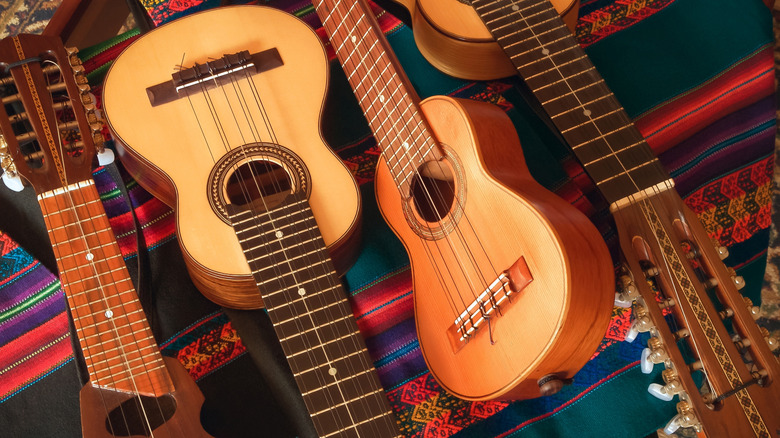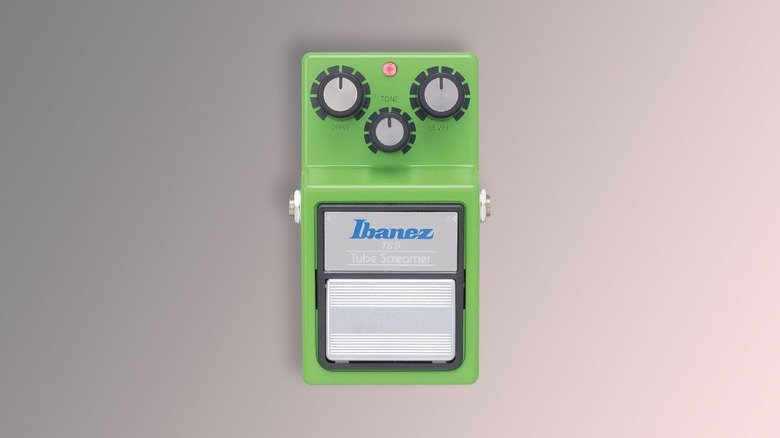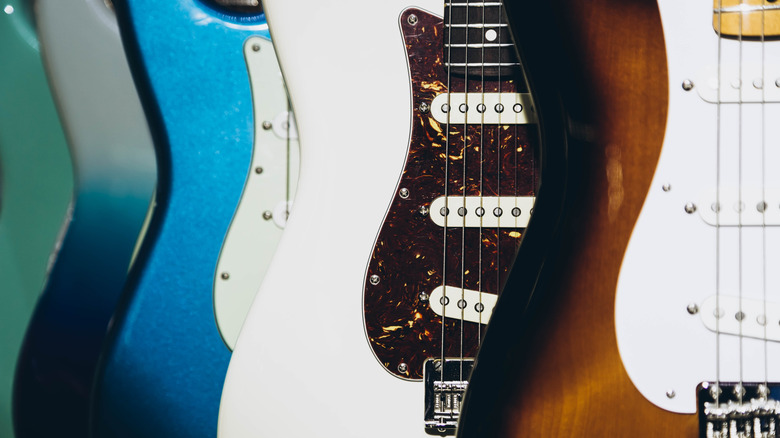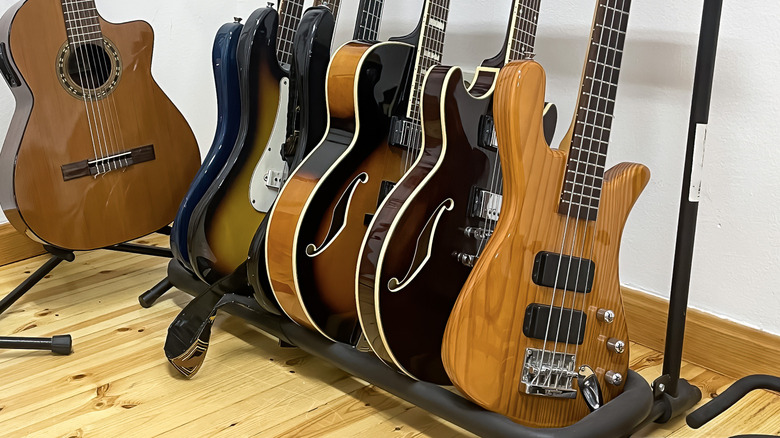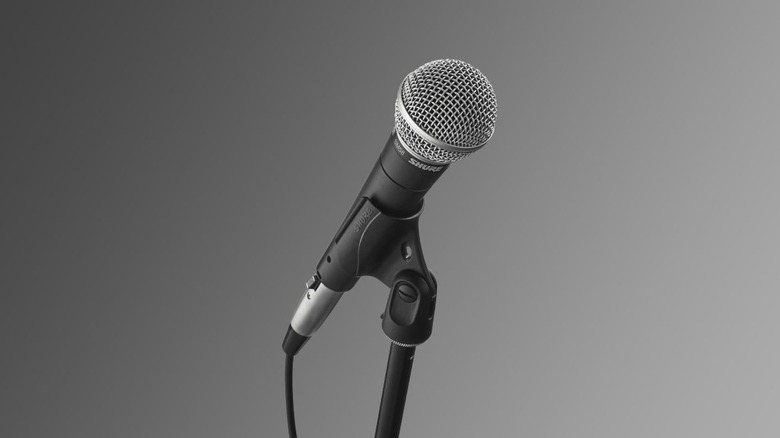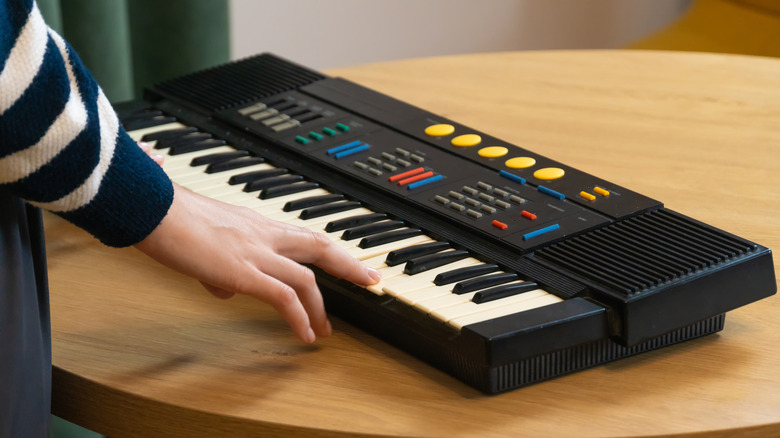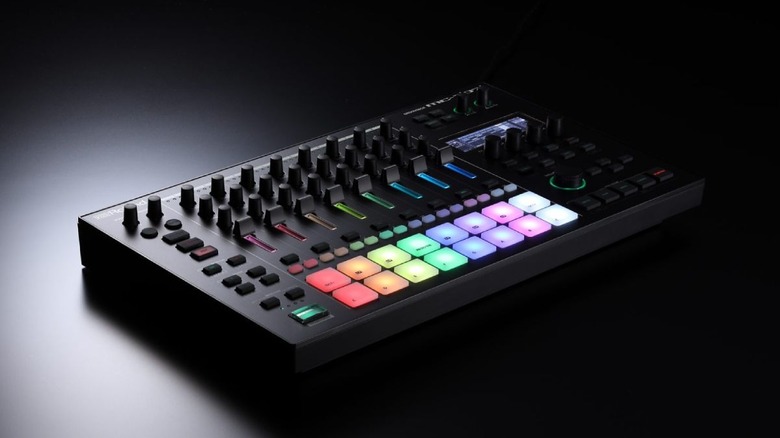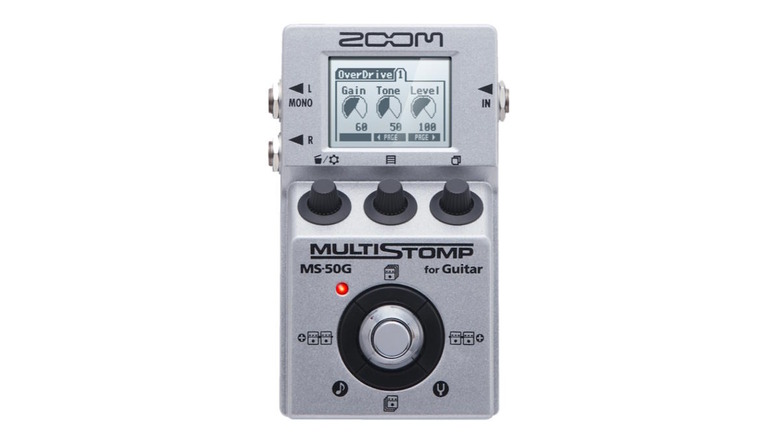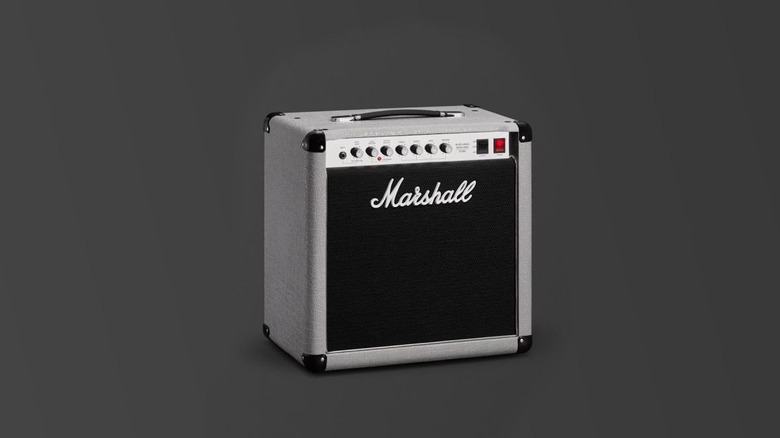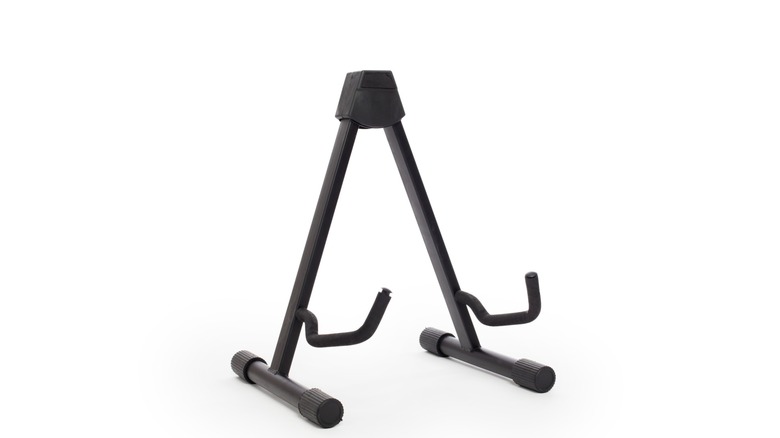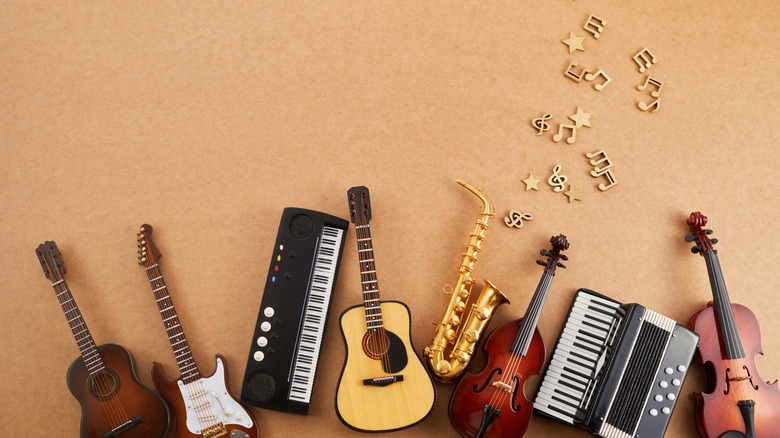9 Of The Best Musical Instruments & Gear To Look For At Garage Sales
Buying used gear is a stressful and exciting event no matter where it happens. Whether it's a conversation on the ever-more-popular Facebook Marketplace or its web 2.0 equivalent, Craigslist, a flyer left in a music center, or even a friendly get-together in a neighborhood not far from your home, there's nothing quite like the prospect of finding a new instrument at half the original price — which might just happen to develop serious issues as soon as you're back home. To take advantage of the first while avoiding the second, you have to start by looking for the right kind of used gear.
The best way to find a great deal on gear is to not look for a specific instrument, for two reasons. First, there's a good chance your gear of choice is very popular, meaning you'll have to compete with a lot of people also trying to get a good deal. Lots of competition drives up the price, but since no one gets a great deal, perfectly functional and popular instruments are left unsold. The second reason is that lesser-known gear is often sold for lower prices without necessarily being worse. That means if you're looking for a used acoustic guitar, you could look for every good obscure acoustic from a few years ago, but it makes more sense to look for every guitar on sale for cheap in your area and find one that's actually good. The same goes for all the gear in this list.
Guitar pedals
Pedals don't have a lot of moving parts, and they're literally made to be stomped on repeatedly, so it's likely that most of the ones you'll find at garage sales will be in decent condition. That said, you should still give them a go if possible. If someone has a pedal, they almost certainly have a guitar and an amp as well. Analog pedals often develop an issue that makes knob movement imprecise or creates a noise whenever they're manipulated. More often than not, those issues are easy to repair, and sometimes they just need to be cleaned with some contact cleaner. To be safe, you should only buy a used pedal once you've verified its condition and know that the eventual fix will be worth the effort.
The same is true of digital pedals, even if the issue might manifest as jittering or a change in value without movement. Counterintuitively, it's often more expensive to repair a badly damaged digital pedal than an analog one. Replacing a strip of metal is only challenging because you have to find materials comparable to the original, but while getting a new chip isn't hard, replacing the software it was running might actually be impossible. In either case, whether repairing a pedal is worth it depends on the value of the pedal itself. You're much more likely to find the common, essential guitar pedals that every guitarist owns than boutique pedals, and those aren't worth buying if they don't work perfectly well.
Guitars of any kind
The world has no shortage of guitar enthusiasts with no time to play or space in their home. While it's true that this type of person usually prefers to list their gear online, selling to other collectors and enthusiasts at a better price, it's also true that there are a lot of them, and not all of them want to spend months trying to sell their old instruments. Guitars are one of the most popular musical instruments around, so of course they're the ones you'll more often find at garage sales. Recognizing a damaged guitar is easy: Look for cracks (especially on the bridge and top of the body) and signs that the glue between the bridge and the body is failing. Above all, just play them and listen for any weird sounds.
The most popular types of guitars are acoustics and solid-body electrics, so that's what you'll find at most garage sales. While you can and should keep in mind the major electric guitar and acoustic guitar brands, the best way to find a great-sounding instrument used and for cheap is to just try them. You don't really need to know how to value the sound of an instrument — it just has to sound good to you. For electric guitars, you should also keep in mind that the amp you play them through influences the sound just as much as the guitar itself.
Bass guitars
Bass might not be as popular an instrument as guitars, but it's still part of the guitar-piano-drums-bass ensemble of pop music this side of the 20th century. And unlike drum sets and pianos, it's a lot easier to stick one of those in your car. There might not be as many bass guitars on sale as regular guitars, but the demand is also low, making the ratio of available instruments to interested customers similar to that of guitars. Unlike the occasional good acoustic guitar you can come across at a garage sale, pretty much every bass will need to be plugged into an amp to be played. Make sure you do that. You might get a feel for the neck and frets, but you won't be able to identify potential issues if you don't properly listen to the bass.
Aside from finding a sound you like, there are a couple of things you should check before buying a used bass. Check that all the frets stop every string completely and without producing a buzzing sound. Make sure that the tone and volume knobs work and don't produce unpleasant sounds when used. Then, inspect the build of the instrument. Does it have any cracks, especially on the neck, body, or headstock? That's not a good sign. Is the neck properly glued to the body, or is there a visible open space between the two? That could be fine if the neck is bolted on, but if it was glued, it means the glue is coming off or was never applied correctly.
Microphones
Microphones are often seen as more specialized gear than other musical instruments. Everyone who takes guitar lessons needs to buy a guitar, but not every singer will have their own microphone. That makes them obviously more rare in the world of used musical gear. On the other hand, microphones aren't just for music, and there's no clear-cut distinction between the two. One of the most popular microphones for vocalists, the Shure SM58, is often found in lists of the best microphones for home recording. A couple of years ago, it even made our list of budget-friendly microphones for podcasting.
It's worth keeping handy a list of the most popular vocal microphones for home studios, since that's the quality gear you're most likely to come across. That said, the best approach when buying used instruments is to keep an open mind and try out gear you wouldn't have sought out otherwise. Make sure you're buying the type of microphone you actually need (which you can easily find out with a quick online search) and, above all, try it. It's worth bringing a laptop and an audio interface with you to test the mic — comparing the recording to your other equipment — if the price is significant. Unlike many other musical instruments, there's a chance the seller might find this weird — microphones are often treated more like tools than gear. Still, if every musician is fine with you playing their guitar before buying it, they shouldn't stop you from testing a microphone.
Budget rompler synthesizers
A rompler is a type of synthesizer that uses pre-selected sounds as samples to imitate a bunch of different sounds. While they are often called samplers or synthesizers, they lack the ability to sample or turn user-recorded sounds into instruments. They also can't do sound-shaping the way a synthesizer ought to. Even simple editing of variables like attack, decay, sustain, and release is usually absent from those instruments. That's a lot of downside for something we're including in a list of stuff you should buy. The upside is that romplers are incredibly popular. The keyboard you see in the toy aisle of any store? That's a rompler — and so is every cheap "electric piano" gifted to all the 12-year-olds vaguely interested in music.
So, if they're mostly toys or learning instruments, why would you buy a rompler? For one, the sounds included on those old, cheap instruments often have some interesting (if cheesy) tones. The more expensive romplers have some good sounds on there as well — the kind of quality that landed them inside lots of hits and movie soundtracks. Many romplers can also be used as "dumb" MIDI controllers, as long as they have a MIDI out. That said, they don't make for a great first MIDI controller. You won't have CC knobs, and you definitely won't be able to customize every MIDI channel, but if a rompler has MIDI ins and outs and an output jack, it effectively doubles as a sound module and a (mediocre) MIDI controller.
Synth workstations and grooveboxes
A synth workstation is the name given to a type of versatile synthesizer popular between the late '80s and early 2000s, when digital sound generation was starting to become more affordable than analog, but DAWs (and computers that could run music production software) were still uncommon. It's easy to spot a workstation. It usually looks like a regular synth with a keyboard and a lot of buttons and knobs, but it often comes with a screen too. Don't expect much more than a tiny LCD screen with a handful of characters, though, unless you're willing to pay extra for the convenience. Workstations can usually do a lot of sound shaping, sequence programming, and sometimes sampling too, and they're generally easy to connect to other gear via MIDI.
Another important characteristic of workstations is the ability to play multiple sequences at once in order to reproduce a whole programmed song, just like you would with a DAW in a modern home studio. Grooveboxes are similar, but they aren't usually meant to produce a whole song, focusing instead on the bass and drum parts. If a workstation is a DAW in a box, a groovebox is more of a sketchpad. However, some genres that rely on simple arrangements or lots of sampling, hip-hop and EDM chief among them, can be well-served by grooveboxes. Sequencing a drum part on a groovebox is usually very straightforward, while it's hellish on most workstations. Take a string section instead, and the roles reverse.
Multi-effect pedals
Multi-effect pedals are a whole different type of gear from regular pedals. They combine multiple effect pedals into one, hence their name. Some multi-effects pack hundreds of unique sound modification models into a single, compact unit. However, that doesn't make them the same thing as a bunch of pedals. For one, they're almost always digital. You couldn't physically put the machinery that powers 100 pedals in the space of one, of course. Another major difference is that most multi-effect pedals make it quite difficult to play with the pedal's knobs on the spot – for example, by changing the delay time while sound is passing through.
However, while no pedal could possibly have all the knobs needed to control all the sounds it carries, some of the more expensive units, like the Boss ME-80, offer a lot of control in a live setting. Besides, if you're going to buy a multi-effect pedal, it will be because of the convenience and the price. Many of the cheaper multi-effect units come with some good sounds for the price of a single budget pedal. It's not too hard to find a unit from a few years ago, like the MS-50G, for under $100, and while not all the effects sound great by today's standards (digital distortion from this era is a bit rough), the MS-50 is a great unit with plenty of inspiring sounds. Some of the most expensive units can even simulate the sound of classic amplifiers, just like many plugin amp emulators promise to do.
Amps and speakers
If you're willing to move away from the realm of music gear into sound in general, garage sales are a great opportunity to find library speakers for cheap. As usual, it might be worth moving away from the most famous speaker and soundbar brands when you're looking for used gear deals. There are a lot of old or small speaker manufacturers you've never heard of who make great devices that sell for much cheaper than the big names.
Amps are more rare, and the people who own them often know what they're worth, but that's not always the case. Plus, most amplifiers, especially the big, high-wattage expensive ones, are bulky things. Someone who just wants to get rid of them might accept a lower price than what's standard on the used market just to free up space in their home. If you're looking for a great deal, look for an old tube guitar amplifier. Just make sure the amp and preamp still turn on and can play sound before buying them. Repairing an amp, especially a vintage one, can get really expensive.
Piano, guitar, and microphone stands
We're really stretching the definition of gear here, but you can't go wrong buying a stand at a garage sale. Plus, pretty much every musician needs one or two stands, or way too many if you're a collector. A stand is just a piece of metal, or sometimes wood or plastic, shaped so it won't fall apart just by looking at it. What that means is that a stand is just about the safest thing you could buy from a stranger, save perhaps for a tiny digital guitar tuner or other music gadgets.
Pretty much every stand is adjustable, so you don't need to worry too much about your gear fitting inside. Checking if a stand works properly is very simple, too. The important part is that it can sustain the weight placed on it and that it doesn't have signs of rust. Other bad signs are fracture points, unstable hinges, or anything that might look like it will fall apart. Remember, you paid dearly for your instruments. It's not worth putting them in danger to save barely enough money to buy a new pack of guitar strings.
Methodology
We selected the entries on this list based on the likelihood of finding them on the used market — and in particular at garage sales — for a good price. Another important factor was the state in which you might expect to find this gear. For example, analog pedals were included over delicate wooden flutes because they're more popular and more likely to be in good shape after being abandoned in a humid garage for a decade.
